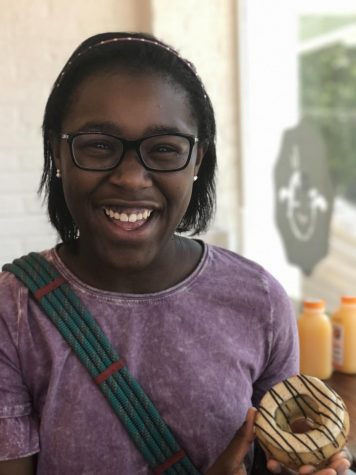My name is Mimi, and I am a senior who is passionate about intuitive eating, a set of principles that helps individuals heal their relationships with food and their bodies. Throughout this year, I will be walking you through the principles of intuitive eating, and throwing in some of the science behind the paradigm and helpful tools to help you get started on your own intuitive eating journey. This week, I will be sharing with you a brief analogy to help introduce you to the principles of intuitive eating, and why this concept is important.

Recently, I learned that I was breathing incorrectly. I was listening to a Ted Talk by Dr. Belisa Vranich with a group of peers. Dr. Vranich is a psychologist who studies how people breathe. In her Ted Talk, Dr. Vranich emphasizes how most of us tend to breathe quickly and frantically, which heightens our shoulders and lifts them up towards the air. While this is how most people breathe, the proper way is to breathe down low into the densest part of our lungs, with our bellies expanding and falling back down.
Dr. Vranich showed how babies intuitively breathe this way, and then those of us watching had a discussion about what we noticed. One of the two males present at the time shared that he already breathes the way Dr. Vranich suggested, while none of the females in the room said they were breathing in this manner. We discussed how it is interesting that women are taught and socialized to suck in their stomachs to look thinner when this goes against the grain of our intuitive deepest breaths.
Intuition is what we are born with and know. Our bodies are intuitive in a lot of ways, with steady beating hearts, breathing, etc. Just like our breathing, societal lessons can shift our abilities to listen to and trust our bodies.
Like breathing, an intuitive function that has been negatively influenced by societal pressures is our ability to read and respond to our hunger and fullness cues.The hypothalamus is the part of our brain that, among other things, manages our sense of homeostasis, or balance, which plays a role in our hunger and fullness cues. One mechanism of regulating these cues is through hormones called leptin, which we know as fullness, and ghrelin, which causes us to feel hunger. Intuitive eating is a set of principles, developed by authors Elyse Resch and Evelyn Tribole, built upon this idea that our bodies are capable of telling us what nutrients we need through our hormonal signals– but only if we consistently listen to them. When we neglect to do this, by dieting for example, our bodies are thrown off and no longer serve this essential duty. The ten principles of intuitive eating coined by Resch and Tribole in their book, Intuitive Eating: A Revolutionary Program that Works, are:
- Reject the diet mentality.
- Honor your hunger.
- Make peace with food.
- Challenge the food police.
- Respect your fullness.
- Discover the satisfaction factor.
- Honor your feelings without using food.
- Respect your body.
- Exercise and feel the difference.
- Honor your health.
If some or many of those terms are confusing to you, don’t worry. Throughout this year, I will walk you through each principle with tools and ideas for making it work on college campuses.
The solution to the disrupted relationship between our internal cues and our decision whether or not to honor them? Practicing listening to our bodies and working towards restoration of its natural rhythms.
Our bodies are incredibly capable and attuned to our needs when we learn how to listen to them. Returning to the initial example, we cannot immediately go back to breathing the way we were born to; it takes intentional and conscious awareness at first to notice the ways we have learned to breathe. We have to mindfully continue to focus on our breath before it becomes intuitive again.
The same goes for our eating and our relationship with food. Babies are born knowing when they are hungry and full, and with cravings that help them honor their body’s nutritional needs. Adapting the principles of intuitive eating and getting to a place where we can have a trusting relationship with our bodies takes practice and time. We need to cultivate a relationship with our bodies where we learn to honor and respect its needs non-judgmentally, and accept that our bodies will land at the set point weight that is most suitable for our unique needs. The work then is in trust, acceptance and honor, just like many relationships.











